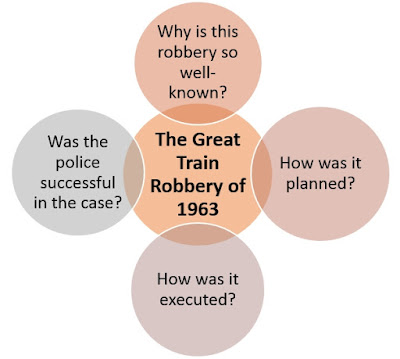 |
Your Daily English Programme #25 - The Great Train Robbery (Reading B2-C1) |
 |
Think Before You Read |
Watch This Short Trailer: How much money do the robbers think there is on the train? How much time will they have to unload the money sacks from the train?
Is the story of this robbery real? Have you watched this TV film? Do you think it would be interesting to watch? Why (not)?
 |
Time to Read |
Read the Passage Once: Fill in the blanks with verbs from the box (Note: you will need to make changes to the verbs to fit correctly in the text)
plan
|
divide
|
steal
|
approach
|
escape
|
capture
|
recover
|
reveal
|
Move your mouse over the underlined words to see their meaning
On August 8, 1963, a gang of 15 robbers _________ £2.6 million in bank notes - the equivalent of more than £40 million in today's money - from a mail train traveling from Glasgow to London. This 'Great Train Robbery', as it has been called since, still remains the most infamous heist in British history.
The robbery was _________ after a postal service worker - nicknamed Ulsterman - __________ detailed information about the huge amounts of money that were regularly carried on the Royal Mail trains. Based on this information, the criminals Gordon Goody and Buster Edwards began bringing in accomplices - Bruce Reynolds, Charlie Wilson, Roy James, and Ronnie Biggs - who they thought could best help carry out the plan. Knowing they lacked the experience to stop and rob trains, this gang decided to enlist the help of another group of criminals who were accomplished train robbers and knew how to tamper with train signals to stop engines.
Just after 3:00 a.m. on August 8, the Royal Mail train was brought to a stop at a red signal outside Leighton Buzzard in Buckinghamshire, close to London. Realizing there was a problem, the 58-year-old train driver, Jack Mills, asked a crew member to go and call the signalman from a telephone nearby. While waiting in the cabin, Jack was __________ by two gang members: one of them hit him on the head with a blackjack, making him unconscious. The robbers then managed to move the train to a spot nearby where sackfuls of money were unloaded within 30 minutes and later _________ among gang members on a nearby farm.
Just 6 days later, the first robber, Roger Cordrey was _________ by the police. The police went on to arrest more members of the gang - not all of them though - in a 5-year period between 1963 and 1968 - Bruce Reynolds being the last one arrested. However, the money from the robbery was never fully _________.
Just after 15 months in jail, one of the gang members, Ronnie Biggs, _________ from prison. He remained a fugitive for more than 35 years traveling to Australia at first, before residing in Brazil and starting a family there. He died in 2013 at a nursing home in East Barnet, North London.
see answers in the first comment below
 |
Let's Practice |
Answer the following questions based on information from the text:
 |
Over to You |
In This 1980's Interview, Ronnie Biggs, the then $7 million escapee, speaks about his life after the Great Train Robbery. Do you think he lived a normal life as a fugitive? Does he express any regrets in this video? Listen to find out ;)
Congratulations! You've finished another lesson on Engramme: Your Daily English Programme. Like and share this post using the buttons below..
Review the Vocabulary from this lesson HERE
Download a Teacher's pdf Copy to use in the classroom HERE

Answers to gap-fill text (in order of text blanks): stole – planned – revealed – approached – divided – captured – recovered – escaped
ReplyDelete